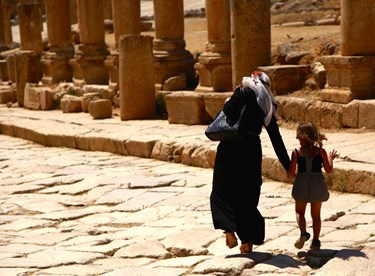The Impact of COVID-19 on refugee women living in Jordan
Zahra is a teacher from Sudan and a mother of five children. She is a women and children’s rights activist and a member of the Survivor Council that leads the Lamp Lifeboat Ladder initiative.
Zahra spoke to us on December 8, 2020. She is currently living in Jordan with her husband and four of her children. She shares with us thoughts on health, equity and human rights.
Many say that if you want to measure the strength of a society then you measure how women are treated in that society. Unfortunately, women are being disproportionately affected by the global pandemic, especially refugee women in Jordan.
Women have a harder time than men in light of COVID-19 - this is because women are the prominent caretakers of children and households– making sure they are safe and taken care of. Not being able to leave their houses has also affected their ability to see and talk with the small community they have formed.
And as for refugee women in Jordan, they are not legally allowed to work, but sometimes are able to find some small jobs working in others’ households, but due to COVID-19 they are no longer able to do that. They can’t work in homes as people they work for are afraid of them and they are afraid of those they worked for (fear of COVID). This has affected their ability to find work for themselves.
I know a lot of refugee women who got COVID-19 and couldn’t get medication and couldn’t afford to get a COVID test and they don’t work so have no income. UNHCR provided additional stipends to some people, but this usually went to pay rent for the houses.
And also the students were affected [as they could not go to school or university]– if children are affected then women are too. Most children have to study online [at home] and therefore they need internet connection, and need devices in order to do this. This affected children’s real ability to learn, and therefore has impacted their education.
This generates much more stress in the household affecting women in particular–adding to the mental health burden.
If I could change something it would focus on health – as health is the most important thing. I would give refugees priority for receiving the vaccine – we need it for work and also for mobility. Now, since we are in the middle of a pandemic, no one wants refugees because everyone is afraid of the disease; no one is travelling at the moment because of the pandemic.
And honestly, right now, everything is unknown, our futures are unknown – people don’t know how to deal with the stress. How will we deal with this pandemic in the long run? People are scared.
Hopefully if we overcome COVID-19 and life would start again, I would want to make sure that the focus is on rebuilding communities, to create a world where humans are treated like humans and have equal opportunities; that they have jobs. From then on, everything would be clear and there would be equality between everyone, and opportunities for people to be heard. I would also want women to have opportunities to be involved in all levels of life.
Get involved
Help us aid refugees who have survived torture and trauma to discover a new life by supporting their relocation to Canada.
